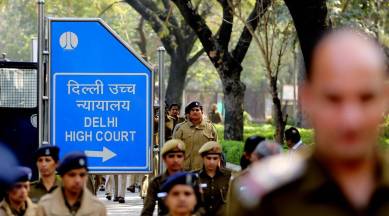Stay updated with the latest - Click here to follow us on Instagram
Delhi HC judge recuses from hearing plea by ‘Indian Mujahideen operative’ challenging bail denial
Justice Siddharth Mridul remarked that he had appeared as a senior counsel for the government with respect to certain bans imposed on SIMI. Indian Mujahideen was formed by members of SIMI after it was banned in 2002.

Delhi High Court judge, Justice Siddharth Mridul on Tuesday recused himself from hearing a plea moved by a man booked under the Unlawful Activities (Prevention) Act or UAPA, who has been behind bars for over nine years in a case where charges are yet to be framed.
The matter was listed before a division bench of Justices Siddharth Mridul and Talwant Singh wherein the accused, Manzer Imam – arrested by the National Investigation Agency (NIA) in 2013 in a case related to alleged Indian Mujahideen (IM) operatives – challenged the trial court’s order denying him bail. Imam was booked under various provisions of the UAPA as well as under IPC sections 121A (conspiracy to wage war/attempt or abet to wage war against Government of India) and 123 (concealing with intent to facilitate design to wage war).
monthly limit of free stories.
with an Express account.
“This is a case of dismissal of bail. I have been in custody for nine years. Arguments on charge are to begin again. This is the larger conspiracy case pertaining to the Indian Mujahideen. IM was banned in 2009, it began in 2003,” Imam’s counsel Kartik Murukutla said, adding that IM was formed by members of the Students Islamic Movement of India (SIMI), an organisation which was banned in 2002.
“Is it alleged that Manzer was a member of the SIMI prior to the IM,” Justice Mridul asked Murukutla to which he replied in the affirmative.
Thereafter, Justice Mridul remarked that with respect to some of the bans imposed on SIMI at the time, he had appeared as a senior counsel for the government for two years. The court thereafter directed that the matter be placed before a different bench of which Justice Mridul is not a member, subject to orders of the Chief Justice. The matter is next listed on January 13.
The high court had in October last year directed the trial court to decide Imam’s bail plea within 75 days, after his counsel submitted that his client had been in custody since October 1, 2013 and had spent over “nine years in incarceration”. It was submitted at the time that charges against Imam have not been framed even till now hence, a time frame be indicated for disposing of the bail application. The NIA said Imam could approach the special court on this issue.
Granting liberty to Imam to approach the special court, the high court held in its October order, “The request seems to be justified. For the aforesaid reasons, the bail application is dismissed as withdrawn with liberty to the applicant to approach the Special Court on the same grounds raised in the present bail application. The Special Court will hear and dispose of the bail application of the applicant within 75 days from the date of this order. With these directions, the application is disposed of”.
On November 28, 2022, the trial court rejected Imam’s bail plea, sought on the ground of delay in the trial. It ruled that the “delay in the trial ipso facto cannot be a reason in the present case to grant bail”, as there was also sufficient material to conclude the accusation against Imam was not false.
Imam also moved a plea seeking a direction to ensure that special courts under Section 11 of the National Investigation Agency (NIA) Act deal exclusively with cases being probed by the central agency. The petition stated that there are only two courts in Delhi notified as designated ones for trials under the NIA Act, resulting in the delay in proceedings. The chargesheet was filed in February 2014, but they are yet to be framed by the court, as per Imam’s petition. A total of 24 persons are accused in the case. In some cases before NIA courts, the accused have been in custody since 2013 and in a majority of them, they were arrested prior to 2020.
At present, the court of Principal District and Sessions Judge, New Delhi and the Additional District and Session Judge-03 (ASJ-03), Patiala House Courts are hearing NIA cases.
In a September status report filed by the administrative side of the Delhi High Court as of July 31, as many as 44 cases under the NIA Act, 2008 are pending before two designated special courts at Patiala House Courts.